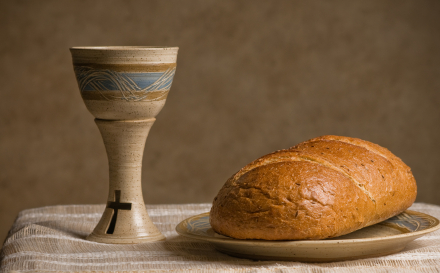August 9, 2009
John 6: 41 – 51
Sister Mary Grace was an Irish nun who ran an orphanage after the Second World War. Joe was a young nine year old boy who entered that orphanage after both of his parents were killed in the bombing of London. Joe was very small and thin. Despite the best attempts of Sister Mary Grace to fatten him, up nothing seemed to work. As much as he would eat, Joe simply did not put on much weight, and so he continued to look like he was close to starvation. One day the government sent a doctor to examine all the children in the hospital. Sister Mary Grace was coming down the hall as Joe left the examination room. In a casual way she asked him “Joe, what did the doctor have to say?” The boy answered, “Well, he told me to undress, and then he said, “My what a miserable little specimen you are!” The nun was shocked by the insensitivity of the doctor’s remarks. But before she could say anything, Joe continued, “But sister,” he said, “I don’t think that the doctor understood that I had made my first communion.”
This young boy for all of his trouble and all of his pain knew that he was not a miserable little specimen. He had received the bread of life. The very presence of Christ was within him. He was a person of dignity and value. He was a child of God. I think his example might be useful to us as we try to understand today’s readings. For in the Gospel Jesus says, “I am the living bread that has come down from heaven.” As Catholics we believe that in the bread of the Eucharist and in the cup which we drink, we receive the very presence of Christ. That the Eucharist provides for us an immediate and real contact with the Risen Lord. The question is how often we do allow the Eucharist to change us? How often do we open ourselves so that the Eucharist can shape our identity and give us power like it did to that young orphan? If we can understand how each time we receive the Eucharist the very power and presence of Christ is within us, then that presence and power can change us. In fact it can shape our past our present and our future.
The Eucharist can shape our past because the Christ that we receive in the Eucharist both forgives us and heals us. All of us have in our past mistakes that we have made, hurts that we still carry, regrets that we can’t erase. But if we can realize that the real presence of Christ which comes to us in the Eucharist is a healing presence, then we can find the power to put the past behind us, to move beyond the mistakes that we have made, to forgive our enemies, and to let anger go.
The Eucharist can shape our present because the Christ that we receive in the Eucharist is the Christ from whom all blessings flow. Having that presence of Christ helps us to recognize how we have been blessed. So often we absorb ourselves with fretting about the details of life and forgetting about the gifts that sustain us. So often we center on what is wrong with our lives and ignore what is right. If we can claim the presence of Christ within us in the Eucharist, Christ can allow is to see what we have been given, the people who love us, the talents we received, and the opportunities that have been given. Then we can live our life more deeply, because we can recognize how we have been blessed. Then we can be thankful.
The Eucharist can shape our future because the Christ that we receive in the Eucharist promises us eternal life. The bread of the Eucharist is our pledge that we will live with God forever. So each time we face evil in our lives that we cannot understand, when we have to deal with sickness or we fear the approach of death, we can receive this sacrament. Then we can realize that the Christ who is with us is one who has promised us that there is still more to come. Christ has promised us that we will have a life where tears will be wiped away, where pain will be relieved, where fears will be allayed. The Eucharist is our hope because the Christ we receive in the Eucharist is our promise of unending joy.
So in a few minutes we as a community will celebrate the Eucharist. We will have the opportunity to receive the Bread of Life and drink from the Cup of Salvation. How important it is that we do not take this gift for granted. How important it is that we open ourselves to the power of Christ that comes to us in this action. The Christ who we receive can heal our past, deepen our future and sustain our hope in everlasting life. Let us then celebrate the Eucharist with thanksgiving. Let us open ourselves to Christ’s power and claim our status as children of God.

